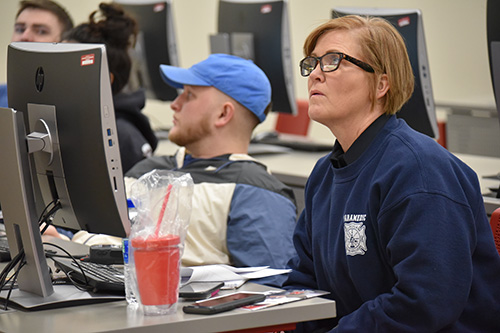College of Business students worked with Lincoln Fire and Rescue to analyze real-life data in a service environment supply chain this fall. The course, Business Analytics/Information Analysis (SCMA 350), allows students to dig deep and make a difference.
Clyde Davis, lecturer in supply chain management and analytics, connected with the fire and rescue when he joined their citizen stakeholder task force two years ago. As he learned more about their services, he crafted a plan to help the department analyze public data and his students strengthen their business analytics skills while making a difference.
Since the data set was dynamic, he knew if students dug down deep enough into the data, they would be able to find unique nuances, allowing for useful results. The project required students to do a data analysis on the department and their service demand, taking all the concepts taught in class and applying them to the data set. They identified and cleaned up “dirty” data, created distributions and control charts, forecasted and completed a variance analysis.
“The project allows students to experience real-life data, and some of the challenges of recording data and how to analyze it. They also see what the impacts are from forming a decision based on the data and finding out if you are correct in your data analysis,” he said. “Representatives from the department can come and observe and ask questions after the students present their findings, which gives the students useful feedback.”
 Nancy Crist, PIO for Lincoln Fire and Rescue, listens to students’ presentations.
Nancy Crist, PIO for Lincoln Fire and Rescue, listens to students’ presentations.
Nancy Crist, public information officer for Lincoln Fire and Rescue, came to listen to presentations and was interested in their unique perspective and methods of identifying controls and outliers. She thought their results could make a useful cross-reference for the departments own data analysis.
“I think these experiences are invaluable. We can teach all we want out of a book or PowerPoint, but we are seeing more and more benefits to experiential and hands-on learning. To actually be able to put a real company behind real data, I see that being advantageous in both directions,” she said. “I believe the way young people think is different than how we might have done things for the life of the fire department. To have students come and bring in innovative ideas is really great for us at Lincoln Fire and Rescue.”
From the project, Davis found true value in the experience students gained. He knew the project could serve students well in potential internship and career opportunities within city and state government.
“Government agencies are constantly trying to increase their ability to analyze their data and make smarter decisions. Whether it is the fire or police department, they are looking at what would make their jobs easier or more efficient,” said Davis. “For the students looking at this data, analyzing and reporting on it gives them a window into the real world to see some of the opportunities available to them while still in school.”
The course serves as a prerequisite for the 12-credit hour business analytics minor. Business majors can pursue the minor to develop a solid technical foundation in data analysis and model-driven management decision-making skills. To learn more about the minor, visit:
https://business.unl.edu/academic-programs/departments/supply-chain-management-and-analytics/business-analytics-minor/.
Published: January 10, 2019